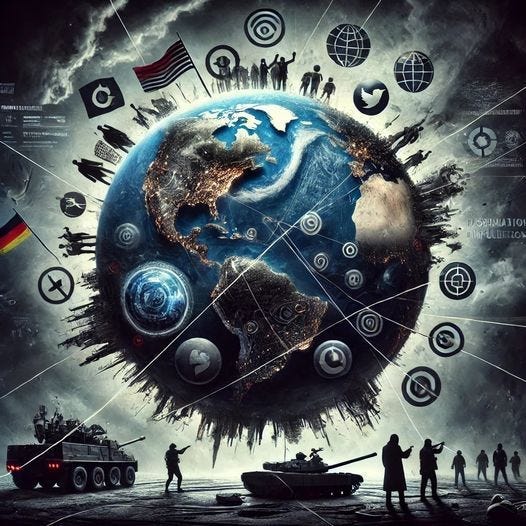The United States Entrapped in Geopolitical Games
The Global Influence of Soviet/Russian Active Measures

In recent years, the world has witnessed a resurgence of geopolitical tensions reminiscent of Cold War dynamics. Central to these tensions is Russia, under the leadership of Vladimir Putin, who has strategically positioned himself at the heart of many of today’s global conflicts.
This article explores the international geopolitical games at play, highlighting the war in Ukraine, the influence of Soviet-era strategies, and the ideological revolts shaking various countries worldwide. It also examines the crumbling state of the United States, once the world’s strongest democracy.
The Ukraine War and Trump’s Controversial Involvement
The conflict in Ukraine serves as a significant flashpoint in modern geopolitics. The war, initiated by Russia’s annexation of Crimea in 2014 and followed by ongoing support for separatist movements in Eastern Ukraine, underscores Putin’s ambitions to reassert Russian influence over former Soviet territories.
Former President Donald Trump’s involvement in Ukraine has also sparked controversy. In 2019, Trump was accused of attempting to strong-arm Ukrainian President Volodymyr Zelensky by withholding military aid to pressure Ukraine into investigating Joe Biden and his son, Hunter Biden. This scandal, which led to Trump’s impeachment, highlighted the intersection of personal political gain and international diplomacy.
Ironically, Trump has repeatedly claimed he could easily end the war between Russia and Ukraine. This assertion, combined with his past interactions with Zelensky, raises questions about the true nature of his relationship with Russia and his understanding of the complex geopolitical dynamics at play.
Russia’s Influence and Global Unrest
Putin’s strategies extend beyond Ukraine. Drawing from his experience in Soviet-era “Active Measures” — a division focused on disinformation, subversion, and propaganda — Putin has skillfully employed these tactics to destabilize democracies worldwide.
Countries experiencing ideological revolts and extremism include:
1. United States: The rise of extremist movements and political polarization has deeply fractured American society. Russian interference in the 2016 and 2020 elections through disinformation campaigns has exacerbated these divisions.
2. United Kingdom: Brexit, driven by a wave of nationalist sentiment, saw significant Russian influence aimed at undermining European unity.
3. France: The Yellow Vest protests, initially about fuel taxes, saw elements of disinformation and extremist infiltration, raising concerns about foreign influence.
4. Germany: Far-right movements like Alternative for Germany (AfD) have gained momentum, with evidence suggesting Russian support for their anti-immigration and anti-EU stances.
5. Italy: Political instability and the rise of populist parties have been influenced by disinformation campaigns, reminiscent of Soviet tactics.
The Crumbling of American Democracy
The United States, once a beacon of democratic values, is witnessing a troubling erosion of its foundational principles. The rise of populist leaders, deepening political divides, and increasing susceptibility to misinformation threaten the stability of its democratic institutions. The Republican Party, historically a strong proponent of US global power, now appears to be undoing the very achievements its forefathers fought for.
The impact of Soviet Active Measures, now modernized under Putin, is evident in the widespread distrust and division within American society. The use of social media to spread disinformation has created echo chambers, making it difficult for citizens to discern truth from propaganda.
Conclusion
The geopolitical landscape today is a battleground for ideological supremacy, with Russia playing a central role in sowing discord and undermining democratic institutions. The Ukraine war, fueled by Soviet-era tactics, serves as a stark reminder of the enduring influence of Cold War strategies.
As countries grapple with internal revolts and extremism, the need for a united front to uphold democratic values has never been more critical. The United States, despite its current struggles, must reclaim its position as a global leader in democracy and resist the forces seeking to destabilize it from within and abroad.
For further insights, refer to:
- [Senate Intelligence Committee Report] (https://www.intelligence.senate.gov/.../report-select...)
- [Foreign Affairs on Russia’s Long War] (https://www.foreignaffairs.com/.../russia’s-long-war...)
- [BBC on Trump-Zelensky Controversy] (https://www.bbc.com/news/world-us-canada-49800181)
By understanding the broader geopolitical games at play, we can better navigate the challenges posed by misinformation and extremism, ensuring a more stable and democratic future for all.

